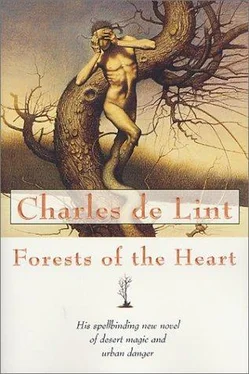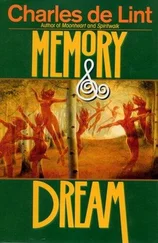So while her grandmother and Ban readied the camp, Bettina sat on a blanket and related the whole of her adventure, from when she first heard los cadejos singing, to when they leapt into her chest and brought her back to Pi-toi’s cave.
“Cadejitos, “Ban murmured thoughtfully.
Bettina corrected him. “Cadejos .That’s what they called themselves.”
They had been small and cute, but somehow the diminutive felt disrespectful.
Ban smiled. “Still, I’ve never heard of such creatures.”
“I have,” Abuela said. “In Guatemala. But I know little more about them than what Tadai told you.”
As they continued to talk, Ban brought out the food Loleta had sent along with them. He didn’t build a campfire, but rather took a small Coleman stove from his pack on which he heated the beans and shredded meat that his mother had cooked earlier. Garnishing them with diced tomato and cilantro, he rolled them up in soft tortillas. Bettina liked watching his hands move, shadowy shapes in the faint glow cast by the stove. He rolled two tortillas for each of them which they washed down with cups of one of Abuela’s herbal teas.
Though insisting she wasn’t at all tired, at Abuela’s request, Bettina lay down after they’d eaten. She shifted about until the jut of her hip and shoulder settled into the small depressions Ban had shown her to dig. It was more comfortable than she’d thought it would be, lying there with a blanket pulled around her against the chill of the desert night. She heard Ban settle down as well, but her grandmother sat up, a small shadow against the starred sky, saguaro uncles and aunts rising up on the slope behind her.
“Did you know this would happen to me, Abuela?” she asked.
She couldn’t see her move, but she could feel her grandmother’s gaze find her.
“I brought you here to introduce you to los pequenos misterios,” Abuela said after a moment. “The spirits you must come to know for your medicina to be potent. But I had not thought they would take you away. I always meant to accompany you on your first visit to that other realm.”
“So these cadejos,” Bettina said. “They’re to be my guardian spirits?”
Her abuela made a tching noise in the back of her throat. “¿Quien sabe? They are a mystery to me.”
“But—”
“Sleep now, chica. We will speak of this again in the morning. Tonight you need your rest.”
Bettina thought it would be impossible to sleep, but when she laid her head down once more, weariness rose up like a swell of dark clouds.
“Ahorita,” she heard a small cadejo voice whisper deep in her mind, just before she fell asleep. “Tenemosuna casa.”
Now we have a home…
Bettina woke in the hours before dawn, uncertain as to what had roused her. From where she lay she could see Ban still sleeping. He lay with his hands folded on his lower chest, face to the stars. Somewhere in the distance, one of his namesakes yipped at the moonless sky, joined moments later by a compadre on another hill. Abuela had left her place under the saguaro and her blanket was still folded beside her pack, but that didn’t surprise Bettina. Her grandmother often wandered abroad at night—in the desert, in la epoca del mito, wherever los pequenos misterios took her. Bettina would have been more surprised to see Abuela sleeping on her blanket as one would expect from a normal person. She was half-convinced that her grandmother never slept.
It was while she was turning onto her other side that she realized what had woken her. First she smelled the cigarette smoke. Sitting up, she looked around to see the tall, lean shape of her father sitting on his haunches a half-dozen feet from where she lay.
“Papa?” she said, whispering so as not to disturb Ban.
“I am here, chiquita.”
He stubbed out his cigarette on a stone and stowed it away in his pocket before coming closer. When he sat down beside her, Bettina snuggled against him. He smelled as he always did, of cigarettes and feathers, of the dry desert after a rain.
“I came as quick as I could,” he told her. “I would have woken you, but you were sleeping so peacefully.” He cupped her chin in his hand and looked into her face. “You are unharmed?”
“Sí, Papa. But I was frightened at first.”
“How was it your abuela allowed you to travel so far on your own?”
“It was an accident,” Bettina said, and then she told him how it had happened, who she had met on the other side.
Her father had always been a good listener. Bettina had often watched him with other people, saw how he focused all his attention on them when they spoke. She knew he wasn’t the sort to wish he was somewhere else, or be thinking of what he would say when the other speaker was done the way she sometimes found herself doing—especially with some of Adelita’s friends. Anyone in her father’s company had his complete and undivided attention which, she’d also noticed, many found to be unnerving.
But she didn’t. She held close to this rare moment of intimacy with him. It wasn’t that he neglected them, but that he was an anachronism and his life moved to a different current from that which pulled his family. Though he remained close to them, he could not live as they did, always walking on cement and carpets. He needed the earth underfoot. He needed to hunt for his food in the desert, instead of in a store; to go into the wild places where his Indio blood called him. He had never been in a car. He had never used a telephone. He saw no reason to change a way of life that had already endured for thousands of years.
“You don’t own a home,” he would say. “You only visit in it for a while.” Though of course Mama, raising a family, disagreed.
“These new tribes that have come to this land,” he would say, “they have no understanding of the desert, the mountains, the wild places and the spirits living in it. They have their politics, but we have the rituals. They have religion, but we live with the spirits. They live in a world without harmony, without mystery.”
Bettina had often wondered what had brought them together, her Indio father and her mostly Mexican mother. Her abuela, her mother’s mother, seemed closer kin to her father than Mama did. But this was not something she would ever ask either of them. And they seemed content in their own way, only arguing when it seemed the girls grew too wild. Then Papa would walk off into the desert for longer than usual and Abuela would make his arguments for him. Since her grandmother had come to live with them, her father spent more and more time with his peyoteros in the desert.
“Papa,” Bettina said when she finished relating her tale. “I think they’re still inside me. Los cadejos. I can feel them… shifting sometimes, against my bones. Or I hear a faint echo of their voices in my head.”
He regarded her for a long moment, dark gaze seeming to look under her skin, into her spirit, before he gave her a slow nod.
“I don’t think they mean you harm,” he said. “Pero, if you are worried, you must ask your abuela to take you to the shrine of the inocente. Do you know the place I mean?”
Bettina nodded. It was north of where they lived, along the river, a crude shrine built from old adobe bricks with only the vague memory of an image in their center. On every ledge and protruding space of the shrine stood the stubs of burned-down candles, a lava flow of wax drippings that almost covered the bricks in places. A man had killed his son in this place, the story went, killed him for simply talking to his beautiful second wife, not recognizing his victim as his own son until it was too late. That innocent ghost was said to be able to chase away unwanted spirits, to take care of those who had been wronged as he was.
Читать дальше












